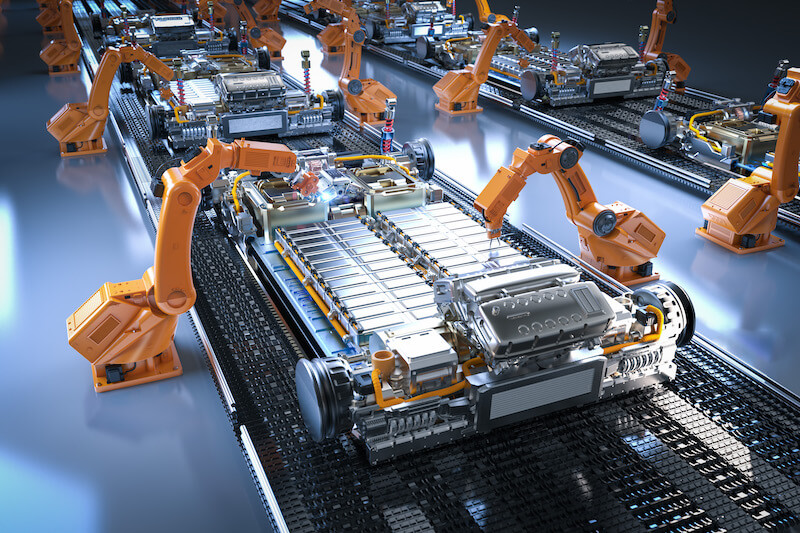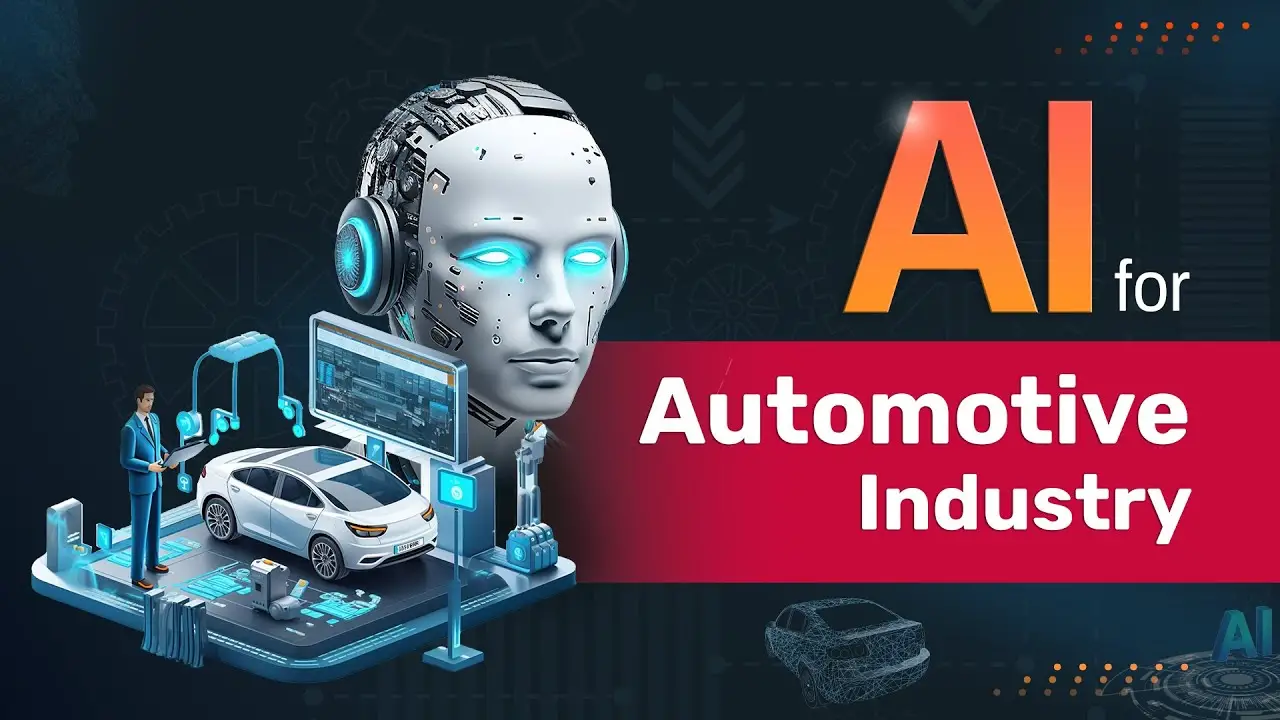Artificial Intelligence in the Automotive Industry Revolutionizing Mobility and Efficiency

Artificial Intelligence in Automotive Industry always been at the forefront of technological advancements, constantly striving to improve efficiency, safety, and user experience. In recent years, the industry has witnessed a transformative revolution driven by the rapid advancements in artificial intelligence (AI).
AI technologies are reshaping every aspect of the automotive ecosystem, from manufacturing processes to autonomous driving, connected cars, fleet management, and road infrastructure monitoring. This comprehensive article delves into the profound impact of AI on the automotive industry, highlighting the key applications and exploring the potential benefits and challenges posed by this technological revolution.
Artificial intelligence in automotive industry: An Overview
Artificial intelligence is a branch of computer science that focuses on creating intelligent machines that can perform tasks that typically require human intelligence. These machines use algorithms and data to learn, reason, and make decisions, mimicking human cognitive abilities. In the automotive industry, AI is being used to enhance efficiency, safety, and user experience in various areas. Let’s take a closer look at some of the key applications of AI in the automotive industry.
Unleashing AI’s Potential in Automotive Manufacturing: Efficiency and Precision
One of the most significant impacts of AI in the automotive industry is in manufacturing processes. AI-powered robots are being used to perform repetitive tasks with accuracy and consistency, optimizing production lines and reducing human error. These robots can work 24/7 without fatigue, leading to increased productivity and reduced labor costs.
Moreover, AI algorithms analyze vast amounts of data in real-time, identifying potential defects and preventing costly product recalls. This technology is known as predictive maintenance, and it enables manufacturers to detect and address issues before they become major problems. This not only ensures the highest standards of product quality but also minimizes downtime and reduces maintenance costs.
Artificial intelligence in automotive industry – AI-Powered Quality Control
Quality control is a crucial aspect of automotive manufacturing, and AI is revolutionizing this process. AI-powered cameras and sensors are used to scan vehicles for defects, such as scratches or dents, during the production process. These images are then analyzed by AI algorithms, which can detect even the tiniest imperfections that may be missed by human inspectors. This ensures that only high-quality vehicles make it to the market, reducing the risk of product recalls and improving customer satisfaction.
Artificial intelligence in automotive industry – AI-Enabled Supply Chain Management
AI is also being used to optimize supply chain management in the automotive industry. By analyzing data from various sources, including suppliers, manufacturers, and distributors, AI algorithms can predict demand and optimize inventory levels. This helps to reduce costs and improve efficiency in the supply chain, ensuring that the right parts and components are available at the right time.
AI-Driven Autonomous Vehicles: Transforming Mobility and Safety
Autonomous vehicles represent one of the most significant advancements in the automotive industry, powered by AI’s ability to process vast amounts of data and make decisions in real-time. These vehicles use a combination of sensors, cameras, and AI algorithms to navigate roads, avoid obstacles, and make split-second decisions. This technology has the potential to revolutionize mobility and safety on our roads.
Artificial intelligence in automotive industry – Levels of Autonomy in Vehicles
The Society of Automotive Engineers (SAE) has defined six levels of autonomy in vehicles, ranging from level 0 (no automation) to level 5 (full automation). Most vehicles on the road today fall under level 1 or 2, which includes features like adaptive cruise control and lane-keeping assistance. However, with advancements in AI, we are now seeing more vehicles reaching level 3 and 4, where the vehicle can handle most driving tasks but still requires human intervention in certain situations. Level 5, or full automation, is still in the development stage and is expected to become a reality in the near future.
Artificial intelligence in automotive industry – Benefits of Autonomous Vehicles
The potential benefits of autonomous vehicles are numerous. They can reduce accidents caused by human error, improve traffic flow and efficiency, and provide mobility solutions for people with disabilities or limited access to transportation. Moreover, as these vehicles are powered by electric motors, they can also help to reduce carbon emissions and combat climate change.
AI for Connected Cars: Enhancing Connectivity and User Experience
Connected cars, also known as smart cars, are vehicles equipped with internet connectivity and a range of sensors and devices that enable communication with other vehicles, infrastructure, and the internet. AI plays a crucial role in making these cars truly “smart” by processing data from various sources and providing real-time insights and recommendations.
Artificial intelligence in automotive industry – Intelligent Navigation and Routing
AI-powered navigation systems use real-time data from sensors, cameras, and GPS to provide accurate and efficient routing information. These systems can take into account factors such as traffic, weather conditions, and road closures to suggest the best route for the driver. This not only saves time but also reduces fuel consumption and emissions.
Artificial intelligence in automotive industry – Personalized In-Car Experience
AI is also being used to enhance the in-car experience for drivers and passengers. Voice recognition technology allows drivers to control various functions, such as music, navigation, and climate control, without taking their hands off the wheel. AI algorithms can also learn driver preferences and adjust settings accordingly, providing a personalized experience for each user.
AI in Fleet Management: Optimizing Operations and Fleet Utilization
Fleet management involves managing a company’s vehicle fleet, including acquisition, maintenance, and disposal. AI is transforming this process by optimizing operations and improving fleet utilization.
Artificial intelligence in automotive industry – Real-Time Vehicle Tracking and Monitoring
AI-powered telematics systems allow fleet managers to track and monitor vehicles in real-time. This provides valuable insights into vehicle location, speed, and fuel consumption, enabling managers to make informed decisions about route planning, maintenance schedules, and driver behavior.
Artificial intelligence in automotive industry – Predictive Maintenance for Fleet Vehicles
Similar to its application in manufacturing, AI is also being used for predictive maintenance in fleet management. By analyzing data from sensors and telematics systems, AI algorithms can predict when a vehicle will require maintenance or repairs. This allows fleet managers to schedule maintenance at the most convenient time, reducing downtime and minimizing costs.
Predictive Maintenance Using AI: Ensuring Proactive Vehicle Care
Predictive maintenance is a key application of AI in the automotive industry, and it has the potential to save companies millions of dollars in maintenance costs. By using sensors and AI algorithms, vehicles can monitor their own health and detect potential issues before they become major problems. This not only reduces maintenance costs but also improves safety and reliability.
Artificial intelligence in automotive industry – How Predictive Maintenance Works
Sensors are placed on various parts of the vehicle, such as the engine, brakes, and transmission, to collect data on performance and wear and tear. This data is then analyzed by AI algorithms, which can identify patterns and predict when a part is likely to fail. This allows for proactive maintenance, where the part can be replaced or repaired before it causes any issues.
Benefits of Predictive Maintenance
The benefits of predictive maintenance go beyond cost savings. It also helps to improve safety by preventing unexpected breakdowns and accidents caused by faulty parts. Moreover, by reducing downtime, companies can improve productivity and customer satisfaction.
Introduction to Artificial Intelligence Computing Leadership from NVIDIA
The Future of Luxury Rolls Royce Electric Cars
AI in Road Infrastructure Monitoring: Ensuring Seamless Transportation
AI is also being used to monitor road infrastructure, including traffic signals, bridges, and tunnels. By analyzing data from sensors and cameras, AI algorithms can detect potential issues and alert authorities before they become major problems. This helps to ensure the safety and efficiency of our roads.
Artificial intelligence in automotive industry – Intelligent Traffic Management Systems
AI-powered traffic management systems use real-time data from sensors and cameras to monitor traffic flow and make adjustments to traffic signals accordingly. This helps to reduce congestion and improve the overall flow of traffic, saving time and reducing emissions.
Artificial intelligence in automotive industry – Road Infrastructure Maintenance
AI is also being used to monitor the condition of roads, bridges, and tunnels. By analyzing data from sensors and cameras, AI algorithms can detect cracks, potholes, and other issues that may require maintenance. This allows authorities to address these issues before they become major problems, ensuring the safety of drivers and passengers.
AI-Enabled Vehicle Diagnostics: Real-time Insights for Preventive Maintenance
In addition to predictive maintenance, AI is also being used for real-time vehicle diagnostics. By analyzing data from sensors and systems within the vehicle, AI algorithms can provide insights into the health and performance of various components. This allows for proactive maintenance and can help to prevent breakdowns and accidents caused by faulty parts.
Artificial intelligence in automotive industry – Onboard Diagnostics
Onboard diagnostics (OBD) is a system that monitors the performance of a vehicle’s engine and other key components. With the help of AI, OBD systems can now provide real-time insights into the health of these components, allowing for preventive maintenance and reducing the risk of unexpected breakdowns.
Artificial intelligence in automotive industry – Remote Vehicle Diagnostics
Remote vehicle diagnostics use telematics systems to collect data from vehicles and transmit it to a central location. AI algorithms then analyze this data and provide real-time insights into the health and performance of the vehicle. This allows for remote monitoring and maintenance, reducing the need for physical inspections and saving time and costs.
AI Impact on the Automotive Supply Chain: Enhancing Collaboration and Efficiency
The automotive supply chain is complex, involving multiple suppliers, manufacturers, and distributors. AI is being used to optimize this process by improving collaboration and efficiency.
Demand Forecasting and Inventory Management
By analyzing data from various sources, including suppliers, manufacturers, and distributors, AI algorithms can predict demand and optimize inventory levels. This helps to reduce costs and improve efficiency in the supply chain, ensuring that the right parts and components are available at the right time.
Collaborative Planning and Scheduling
AI is also being used to improve collaboration between different players in the supply chain. By analyzing data from various sources, including production schedules, inventory levels, and transportation routes, AI algorithms can optimize planning and scheduling, ensuring that all parties are working together efficiently.
Artificial Intelligence Reshaping the Future of the Automotive Industry
The impact of AI on the automotive industry is undeniable, and it is only expected to grow in the coming years. With advancements in technology, we can expect to see more autonomous vehicles on our roads, enhanced connectivity and user experience in cars, and improved efficiency and safety in manufacturing processes. However, with these advancements come challenges that need to be addressed, such as data privacy and security concerns, ethical considerations, and potential job displacement.
Conclusion
In conclusion, artificial intelligence is revolutionizing the automotive industry, transforming mobility, efficiency, and safety. From manufacturing processes to connected cars, fleet management, and road infrastructure monitoring, AI is making our vehicles smarter and our roads safer. As we continue to push the boundaries of technology, it is essential to address the challenges and ensure responsible and ethical use of AI in the automotive industry.
Tesla AI Unleashing the Power of Artificial Intelligence in the Automotive Industry
The Impact of Artificial Intelligence on the Automotive Industry










